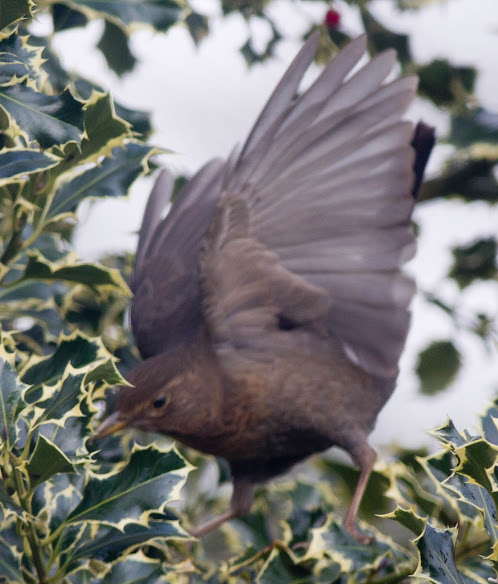A to Z challenge 2023 – T is for . . .
My
theme for this challenge is Nature in all much of her wonderful
diversity. My posts will reflect the fact that I am resident in the south of
England.
All
photographs in this post are the property of the writer.
T is for
Turdus merula (blackbird)
Blackbirds
are common across the UK in every terrain, apart from the highest peaks.
The male blackbird is all black with golden eyes and bill. Mrs Blackbird and all the little blackbirds are brown with splotches on their breasts and their beaks are a duller yellow-brown. The birds are noticeable for their habit of flicking their tails when alighting on trees or shrubs. Maybe it is an aid to gaining their balance on landing.
Often blackbirds can be seen on the ground, cocking their heads towards the ground, looking as if they’re listening and in fact, that is exactly what they are doing. They can hear movement below the surface of the earth and pull up earthworms to eat. They also eat caterpillars, berries and fruit and can frequently be seen rustling through the undergrowth, flipping leaves over as they search for insects.
Mrs Blackbird is brownIt is said to be a sign of good luck if blackbirds nest near your house, but their colouring also made them a symbol of death, mystery or magic. Shamans considered them spirit messengers and others held them sacred to gods and goddesses in mythology.
In Ireland in the 19th century, blackbirds were believed to contain the souls of those condemned to remain in purgatory until Judgement Day. When their cries were more than usually shrill, it was said it was the suffering parched souls calling for water.
In England in the 16th century, pastry cooks and chefs were noted for devising unusual dishes with surprising contents. Thus, ‘Sing a song of sixpence’ may be based on such a pie.
Sing a song of sixpence,
A pocket full of rye
Four and twenty blackbirds
Baked in a pie.
When the pie was opened
The birds began to sing,
Now wasn’t that a dainty dish
To set before the King?
The King was in his counting
house.
Counting out his money,
The Queen was in the parlour
Eating bread and honey,
The maid was in the garden
Hanging out the clothes,
When down flew a blackbird
And pecked off her nose.
Hearing all the commotion,
Little Jenny Wren
Flew down into the garden
And stuck it on again.
The last verse was added later to make the tale more palatable.
Whether such a pie was ever served has fired many imaginations and plausible and implausible explanations, but it is true that in Tudor times interesting things were put inside pie crusts. The custom continued into the 17th century - see Jeffrey Hudson.






I remember my children objecting to that song, they reasoned that any bird baked within a pie would no longer be able to sing.
ReplyDeleteAbsolutely logical!
DeleteI've never heard that final verse of' Sing a song of sixpence' and am wondered when it was added. (I can hear in my head a right wing politician complaining about 'woke' nursery rhymes!)
ReplyDeleteCheers, Gail.
Apparently, it was added in the 19th century but I don't know why.
DeleteThe blackbird really does have a beautiful song and might well have chosen a high point in a tree to proclaim its territory. But his silky black appearance in the first photo is probably to display himself in order to attract females. Cocky bird!
ReplyDeleteCocky bird indeed!
ReplyDeleteMy comments are going to your spam folder :(
ReplyDeleteoops. sorry, I found it right up the top there.
ReplyDeleteWe used to have lots of blackbirds visiting our garden, before they were decimated by the Usutu virus a couple of years ago. Such a shame. We've only started spotting the odd blackbird again this year ... xxx
ReplyDeleteBird viruses are terrible - they spread so easily. Hope your blackbird population picks up.
DeleteWe only found out last week that blackbirds are a variety of thrush. Mr T and blackbirds have long and adversarial history - we had one male blackbird so determined to attack Mr T that air raid shelters had to be strategically positioned around the garden!
ReplyDeleteI didn't know blackbirds could be so aggressive and determined. Poor Tigger!
ReplyDeleteThat first photo is absolutely beautiful.
ReplyDeleteRonel visiting for T:
My Languishing TBR: T
Terrifying Trolls
Thank you, Ronel.
Delete